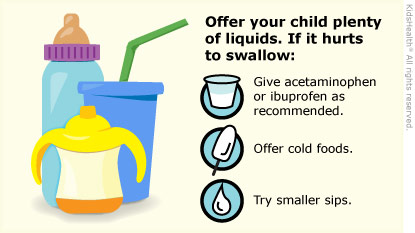Herpangina is an infection caused by different types of viruses (germs). Kids with herpangina (hur-pan-JY-nuh) have sores in the back of the mouth and throat. The sores often cause pain, so kids may not want to eat and drink. This can lead to dehydration (not enough water in the body). You can help your child feel better until the sores heal.



Your child:

Your child:
You know your child best. If your child has symptoms that worry you, call your health care provider or go to the ER.

Can herpangina cause other symptoms? Yes, kids with herpangina also may have a fever, sore throat, drooling, headache, stomachache, vomiting, or crankiness.
Do antibiotics help herpangina? No. Antibiotics treat infections caused by bacteria. Viruses cause herpangina.
Is herpangina contagious? Yes, the viruses that cause herpangina can spread to others through poop, spit, mucus from the mouth or nose, and fluid from a sore.
What can families do to avoid spreading the virus?